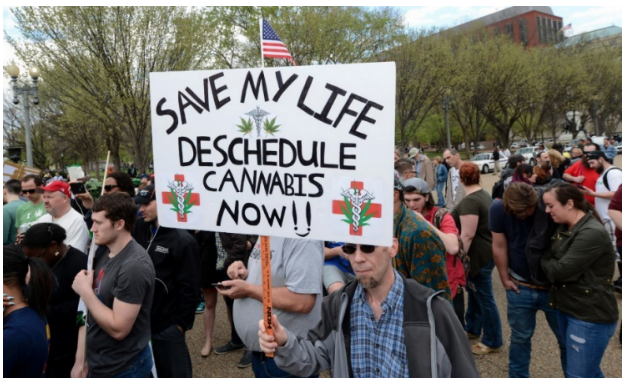Advocacy groups: Legalize it! Tons of benefits
Recently, a group of more than 50 physicians called Doctors for Cannabis Regulation (DFCR) announced their presence and their purpose, endorsing marijuana for adult recreational use and public health benefits.
DFCR offers a break from the American Medical Association (AMA) stance on medical marijuana. Even though the AMA is the largest membership of doctors in the country, the smaller group, DFCR, is making an argument that legalizing marijuana does more good than harm. 
Here, holding a sign in front of the White House on April 2, Charles Schatz of Bel Air, Md., joins dozens of demonstrators, demanding the use of marijuana for medical cases.
According to Christopher Ingraham in the Washington Post article, the DFCR cites “hundreds of thousands of annual marijuana arrests, racial and economic disparities in marijuana enforcement, and the role of prohibition in keeping marijuana prices high and lucrative to violent drug dealers…”
Ingraham notes that the physicians believe that allowing the legalization of marijuana and regulating it is the best way to avoid criminalization from illicit drug trade, to ensure public safety, and to combat the negative consequences of strict enforcement polices in certain disadvantaged communities.
At the federal level, the Senate Appropriations Committee also recently passed an amendment allowing doctors at the Veterans Health Administration, (VA), to use marijuana or cannabis to treat certain illnesses such as anxiety and post-traumatic stress disorder (PTSD) in their patients.
The drug is known to be beneficial for a wide array of illnesses such as pain, mental health issues, eyesight, seizures, respiratory illnesses, and even certain immune disorders.
However, there are some who oppose the use of the drug because of its addictive nature.
‘”You don’t have to be pro-marijuana to be opposed to it’s prohibition,”‘ said the founder and board president of DFCR, David L. Nathan.
Nathan addressed the facts that nine percent of adults who use the drug become dependent on it and that heavy uses in adolescents can damage the development of their brains.
Nevertheless, according to researchers, this drug is known to be less harmful to individuals and society than other legal common drugs such as alcohol and tobacco.
